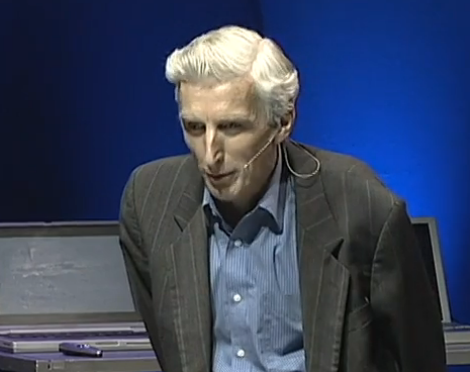Well, let's go back to this picture. There's one challenge symbolized at the top, but there's another challenge to science symbolized at the bottom.
好吧,让我们回到这张图片。在其上部有一个符号化了的科学挑战。而在其下部同样有一个符号化了的科学挑战。
You want to not only synthesize the very large and the very small, but we want to understand the very complex.
除了用理论来一统极大和极小两个世界,我们还要理解其中的复杂性。
And the most complex things are ourselves, midway between atoms and stars. We depend on stars to make the atoms we're made of.
而宇宙中最复杂的东西就是我们自己,我们处于原子和恒星之间。我们依赖恒星制造组成我们身体的各类原子。
We depend on chemistry to determine our complex structure. We clearly have to be large, compared to atoms, to have layer upon layer of complex structure.
我们依赖化学反应来决定我们的复杂结构。相对于原子来说,我们是庞大的,具有多层的复杂结构;
We clearly have to be small, compared to stars and planets -- otherwise we'd be crushed by gravity.
相对于恒星和行星来说,我们又是微小的,否则会被引力压垮。
And in fact, we are midway. It would take as many human bodies to make up the sun as there are atoms in each of us.
事实上,我们处于中间。要用每个人体内的原子数目那么多的人数加在一起才能达到太阳的质量级。
The geometric mean of the mass of a proton and the mass of the sun is 50 kilograms, within a factor of two of the mass of each person here.
太阳质量和质子质量的几何平均数是50千克,和在座的每个人的体重是一个数量级。
Well, most of you anyway. The science of complexity is probably the greatest challenge of all, greater than that of the very small on the left and the very large on the right.
当然,至少是大多数人。对人的复杂性的科学研究可能是最具挑战的,比图左边的微观世界和图右边的宏观世界都更具挑战性。
And it's this science, which is not only enlightening our understanding of the biological world, but also transforming our world faster than ever.
正是这样的科学研究,不仅在启迪我们对生物世界不断加深了解,而且也在更加快速地转变着我们的世界。
And more than that, it's engendering new kinds of change.
以至于还产生了全新的改变。
And I now move on to the second part of my talk, and the book "Our Final Century" was mentioned.
现在我将进入我演讲的第二部分,前面有人已提到了“我们最后的世纪”这本拙作。
If I was not a self-effacing Brit, I would mention the book myself, and I would add that it's available in paperback.
如果我不是一个谦逊的英国人的话,我会自己提到这本书,而且还会告诉大家它有平装版。
And in America it was called "Our Final Hour" because Americans like instant gratification.
在美国这本书被称作“我们最后的一小时” 因为美国人更注重及时行乐。
But my theme is that in this century, not only has science changed the world faster than ever, but in new and different ways.
我的主旨是在最近这个世纪里,科学不仅比以往更快地改变着世界,而且以新的与以往不同的方式。

Targeted drugs, genetic modification, artificial intelligence, perhaps even implants into our brains, may change human beings themselves.
定向药物,基因改良,人工智能,甚至大脑植入等等新科技将改变人类自身的样子。
And human beings, their physique and character, has not changed for thousands of years. It may change this century.
而人类的体型和性格等物理特质近千年来都保持着不变。
It's new in our history. And the human impact on the global environment -- greenhouse warming, mass extinctions and so forth -- is unprecedented, too.
在本世纪中改变即将来临。这将是历史的新的一页。同时人类给全球环境带来的冲击-温室效应,大规模杀伤武器等等-也是史无前例的。
And so, this makes this coming century a challenge. Bio- and cybertechnologies are environmentally benign in that they offer marvelous prospects,
因此,新世纪将是人类面临的挑战。生物和网络技术为更好的改变环境提供了美妙的前景,
while, nonetheless, reducing pressure on energy and resources.
得以减轻我们在能源方面的压力。
But they will have a dark side. In our interconnected world, novel technology could empower just one fanatic,
但是它们也有其负面性。在如今相互连通的世界里,新奇的科技将使得一个狂热分子,
or some weirdo with a mindset of those who now design computer viruses, to trigger some kind on disaster.
或者若干个精神状态古怪的人能编制计算机病毒,造成某种程度上的灾难。
Indeed, catastrophe could arise simply from technical misadventure -- error rather than terror.
确实的是,仅仅是技术事故都将导致严重的灾难 - 灾难往往是无心而为的结果。
And even a tiny probability of catastrophe is unacceptable when the downside could be of global consequence.
而当后果可能是全球性的灾难时,哪怕是非常小的概率也是无法被接受的。












